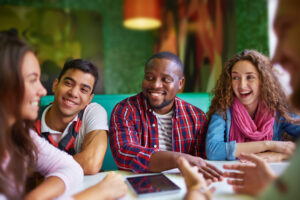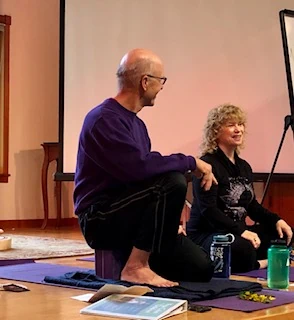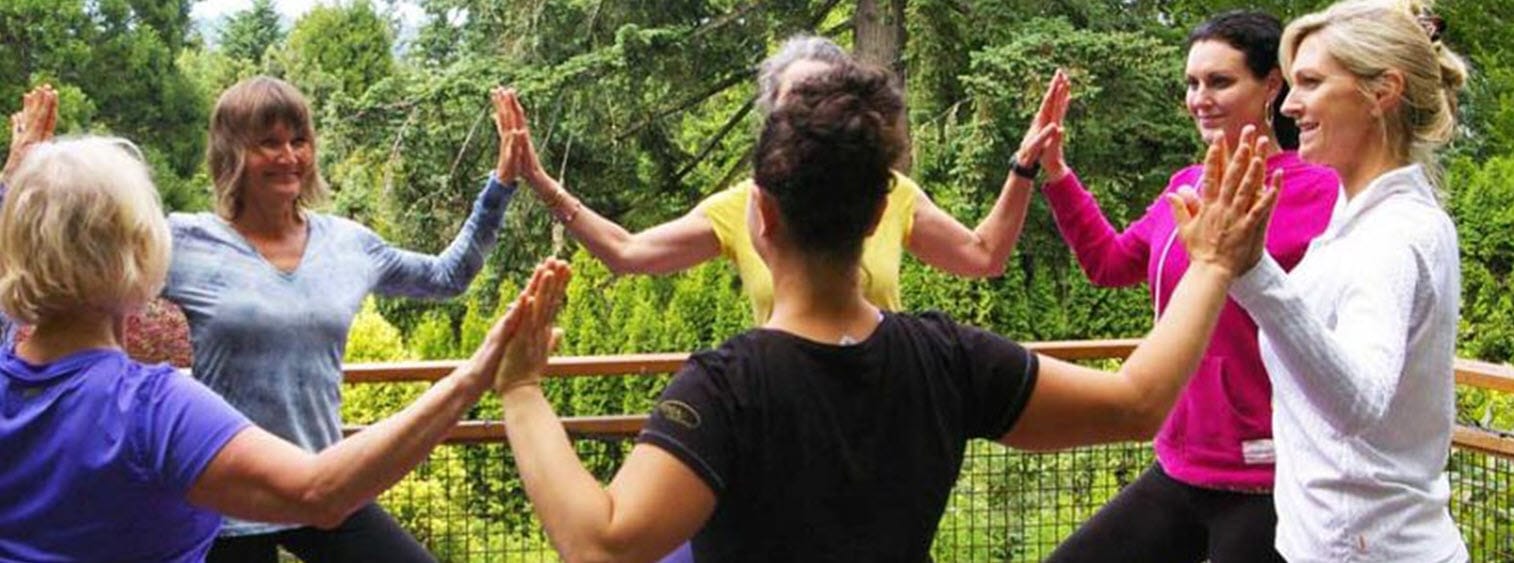Say “yoga,” and you might instantly picture the stereotypical thin white woman in Downward Dog or Cobra or Warrior I, or maybe just breathing deeply, face turned toward the sun. Mindful movement is what seems to define yoga.
But it’s not the foundation.
Where the first yoga sutra states “Now, let us study yoga,” the emphasis is on “us.” Yoga is to be done in community with others. In fact – and this is especially true for kids – it’s only with the safety and support of others that we can learn how to regulate and how to relate.
And Community isn’t just one of the five Yoga Calm principles; it’s Yoga Calm itself. More than just a curriculum, Yoga Calm is a community.
The Benefits of In-Person Interactions

 Although virtual connection was essential for sustaining community through COVID times, many were hyper-conscious of it as a simulation, aware that key aspects of real, in-person interactions were missing, untranslatable through digital media.
Although virtual connection was essential for sustaining community through COVID times, many were hyper-conscious of it as a simulation, aware that key aspects of real, in-person interactions were missing, untranslatable through digital media.
Many studies have shown that real world face-to-face interactions offer benefits that virtual ones can’t completely match:
- Nonverbal Communication. In-person interactions provide the advantage of nonverbal cues such as facial expressions, body language, and tone of voice. Such cues convey emotions, build trust, and foster deeper connections between people. Even in video chat, this expression can be more limited than when we’re physically present with each other, making it harder to accurately interpret the full range of human communication.
- Social Connection and Empathy. Being physically present allows us to experience a sense of togetherness, which facilitates empathy and emotional bonding. Physical touch, such as handshakes or hugs, has been shown to release oxytocin, a hormone associated with social bonding and increased trust.
- Enhanced Collaboration and Creativity. Research suggests that face-to-face interactions facilitate better brainstorming, idea generation, and problem-solving. The ability to engage in spontaneous discussions, read subtle social cues, and build rapport in person can contribute to higher-quality collaborative outcomes.
- Reduced Miscommunication. In-person communication allows for real-time clarification, immediate feedback, and the ability to address any misunderstandings promptly. This direct interaction minimizes the potential for misinterpreting tone, intention, or meaning, leading to more effective communication overall.
- Psychological Well-being. Physical presence promotes feelings of social connectedness, reduces feelings of loneliness and isolation, and provides emotional support. Engaging in meaningful face-to-face interactions has been associated with increased happiness, reduced stress, and improved mental health.
Interestingly, all of these benefits are one reason why we’re such advocates of free play for children. Play facilitates learning many of the skills that are enhanced simply by being in physical presence with each other.
Physical presence facilitates other kinds of learning, as well. Indeed, one oft-cited explanation for the learning loss we’ve witnessed over the past few years has been over-reliance on virtual instruction. The best learning tends to happen in real world spaces, where we can come together as true communities of learners who care about and support each other.
This is why we’re so excited to finally have scheduled our first in-person training since before the pandemic!
Celebrate the Human Spirit with Us This August!

 Slated for August 19 – 20 here in Portland, Oregon, studio and gardens, “Celebrate the Human Spirit!” will focus on how to build resilience through personal and collective practices that utilize time-tested tools, insights and wisdom from decades of creative work.
Slated for August 19 – 20 here in Portland, Oregon, studio and gardens, “Celebrate the Human Spirit!” will focus on how to build resilience through personal and collective practices that utilize time-tested tools, insights and wisdom from decades of creative work.
Drawing on her personal experiences, studies with diverse cultures, and 50+ years of supporting youth as a teacher, counselor, and clinician, Lynea will share empowering activities that help youth tap into their inner strengths and wisdom, expand their sense of community with each other and the natural world – and envision and create the world they want to live in.
She’ll also review the five elements of post-traumatic growth, and how to apply Polyvagal theory and tools for self-regulation and incorporate these into the lives of students, clients, parents and staff in practical and effective ways.
In addition, you’ll learn how to use yoga‐based movement, mindfulness exercises, and social/emotional development practices in a variety of settings – including busy school days – to help students develop self‐confidence, physical health, and emotional intelligence.
Complementing Lynea’s expertise in working with youth, Jim will share teacher self-care practices from his 25 years of teaching yoga and mindfulness, as well as the latest health and wellness research and personal insights.
Together we can support health, hope and happiness and create a positive future for our children!
Register before July 1, 2023, and save $50 on the course fee. You’ll find the full course description and registration link here.

